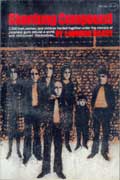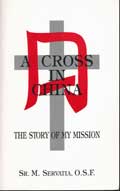 |
THIS TRUE LIFE
ACCOUNT, RICHLY ILLUSTRATED WITH CONTEMPORARY PHOTOS, SKETCHES,
AND NEWS CLIPPINGS, WILL TAKE YOU BACK TO THOSE OTHER DAYS IN TIENTSIN,
PEITAIHO, SHANGHAI, POOTUNG, LUNGHUA, WEIHSIEN. |
|
Norman Cliff's selection:
![[click here]](../NormanCliff/Books/Courtyard/TN_Frontcover.jpg) |
In this story,
covering the first twenty years of his life which were spent in
China, Norman Cliff recalls the arrival of the Japanese armed forces
in the port of Chefoo, where he was at school. He goes on to tell
how in the years following "Pearl Harbour" an entire Mission
school was interned under the Japanese for three years.
The community in Weihsien Camp faced all kinds of hardships and
adversities but the book forcibly reveals God's unfailing protection
and provision during those difficult war years.
The story closes with their dramatic rescue by seven American airmen
in August 1945.
In a sense Norman Cliff's story, going back over three generations
of missionaries, spans the entire eighty years of Protestant missionary
endeavour in China prior to the Communist takeover. --- ![[click here]](../symbols/Right_30pix.gif)
|
|
 |
The
camp became a living laboratory, a miniature society that illustrated
the human condition and moral dilemmas in a way that would not have
been possible had more conventional conditions prevailed. Shantung
Compound is "a fascinating memoir that is both a vivid diary
of prison life and a theologian's mature reflection on the condition
of man in times of stress."-Time Magazine
(click on the picture) |
|
 |
Sister Mary Servatia
(Berg) O.S.F. was born on February 13, 1902 in Chicago Heights,
Illinois and made her Profession of Vows on August 12, 1921. After
twelve years of teaching music at Franciscan schools in Wisconsin,
Illinois, Iowa and South Dakota, Sister Servatia received her missionary
cross and travelled to China.
This book is the story of that mission which began in 1933 when
Sister Servatia ----![[click here]](../symbols/Right_30pix.gif) |
|
 |
TAKEN FROM A LIFE
OF COMFORT AND PRIVILEGE AND THROWN INTO A JAPANESE PRISON CAMP
IN OCCUPIED CHINA, THREE YOUNG ENGLISH GIRLS FACE DEPRIVATION AND
HARDSHIP DURING THE BITTER YEARS OF WORLD WAR II.
The Mushroom Years
tells the story of the house arrest and eventual imprisonment of
a British family in the Orient through the eyes of a teenager. She
and her sisters and her parents are caught with a few thousand innocent
Allied Nationals in the harsh reality of War. Now, more than 50
years later, the author's intimate recollections of the horror,
the humor, and the humanity that made survival possible for both
prisoners and captors alike, allow us to experience in vivid detail
a rare and relatively unknown aspect of World War II.---- 
|
|
![[click here]](aBoysWar/TN_FrontCover.jpg) |
A BOY'S WAR
is a true story of a boy in China in a Japanese concentration camp
during World War II. Yet it is an account more about children and
their adventures than the atrocities of a deathcamp. And it includes
glimpses of Olympic Gold Medalist Eric Liddell not included in Chariots
of Fire.
What might have been simply a tale of an agonizing separation of
a schoolboy from his parents—a separation that spanned six
years and included war, danger, malnutrition, and tragedy—is
a story that lights up with adventure, ingenuity, heroism, and hope.
The unquenchability of the human spirit under extreme pressure and
the influence of godly faith and sacrificial example in hard circumstances
shine through. --- ![[click here]](../symbols/Right_30pix.gif) |
|
 |
FORGIVEN
BUT NOT FORGOTTEN
Memoirs of a Teenage Girl Prisoner of the Japanese in China
Joyce Bradbury (nee Cooke) was born 1928 in China with British citizenship. Following
the declaration of war by the Allies on Japan
after the Japanese bombing of Pearl Harbor
in 1941, she was interned by the Japanese Army at Wei-Hsien
(now called Weifang) northern China
with 2000 other Allied nationals for almost four years.
In this book she tells the amazing story of her family's long
involvement in China, her life growing up in China, the disturbing
experiences of the Japanese internment camp, liberation from the
camp by the US military, post-war China, migration to Australia,
and then employment with the Singaporean police.
She describes her later life in Australia,
her return to China
to visit the former Japanese camp and reflects on the approach
of the Japanese to the barbarities its wartime regime visited
on the many peoples it subjugated.
As her story ends, she pays a moving tribute to an extraordinary
Australian who was the hero of her Japanese prison camp.
![[click here]](../symbols/Right_30pix.gif)
|
|